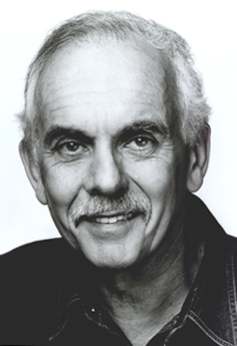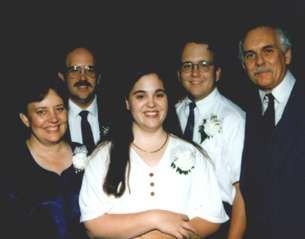| Theatre | Australia | ||||||||||||||||||||||||||||||||||||||||||||||
BAFA © 2010. All material here is copyrighted. See conditions above. |
Phillip Hinton actor, playwright, Australia |
 |
Phillip Hinton was born in war-time Britain and grew up in Cape Town, South Africa to where his parents emigrated in 1947. After undistinguished years at school, in 1961 he became a member of the young Bahá'í Community of Cape Town and by some quirk of fate, was invited to join a professional
theatre company as an actor. At the age of 18, the idea of being both applauded and paid to show off was irresistible, and Phillip decided on the stage as a career path.
In 1963 he made his way to London, to attend the first World Congress of the Bahá´í Faith, held at the Royal Albert Hall, and to pursue his profession. There followed 12 years working first in repertory, on television and with some of Britain's leading directors in The Royal Shakespeare Company, the Chichester Festival Theatre, the Bristol Old Vic, and the Hampstead Theatre Club. In London in a musical comedy, he met a dancer, Ann Constant. They have been married for thirty-four years and have three sons, Sean, Simon and Benjamin. The Hinton family moved to Australia in 1975 and Phillip has continued his acting career on stage, television, films and in radio drama. Recently, he has had guest roles in several US TV productions, The Flood, The Thornbirds - the Missing Years, Tanker Incident, Time Trax and Flipper. He is also in great demand as one of Sydney's leading 'voice over' artists in radio and television advertising and for documentary narrations. In 1992 at the Second Bahá´í World Congress in New York, Phillip played the role of Howard MacNutt in the drama, Heralds of the Covenant, which was performed twice before an audience of 15,000 people in the Jacob Javits Centre. |
|
The solo performance, Portals to Freedom, has toured major cities in Australia and USA, and has been performed at the Seat of the Universal House of Justice in Haifa, Israel and in London and Auckland. Portals to Freedom, adapted by Phillip Hinton from the book of the same name, is the story of Howard Colby Ives who, in 1911 was a minister in the Unitarian Church. Ives was one of a number of leaders of thought and society figures who were privileged to meet `Abdu'l-Bahá during His visit to America in 1911/12. In 1937, Ives published ‘Portals to Freedom’, a detailed memoir of his days in the presence of the Master, which profoundly altered the course of his life. Ives left his ministry in the church to become a devoted Bahá'í. His days of spiritual search and discovery which involved a certain amount of anguished soul-searching are examined in this performance by Phillip Hinton. |

Descendants of Howard Colby Ives (in Portland, Oregon) with Phillip Hinton, 1996. |
Late in 1993 I had a call from a member of a Bahá´í special projects' committee, planning a major National Bahá´í Conference in Melbourne in December that year. They asked me to devise and perform a piece 'in the spirit of the drama presented at the World Congress in 1992'. I had had an idea for some years to adapt Howard Colby Ives' 'Portals to Freedom' as a solo piece for the stage...
|

Philip Hinton performing Portals to Freedom |
...I decided to begin with Howard reciting part of the Lord's Prayer from Luke Chapter 11, verse 1, to place his story in its Christian roots from the
outset. (The last lines of the play are from ‘Abdu'l-Bahá's 'Tablet of Visitation'). Throughout the play Howard talks directly to the audience, they are like 'guests' in his drawing room. The different episodes are linked by a kind of commentary, some of which is in the book but for the most part, I imagined him telling the audience, for instance (after the story of the first meeting with the Master) "So! So was born - how can I describe it?
... that mystic bond, that attraction between the seeker and the object of his quest. You know, I have often asked myself how it was that I was chosen for so rare a privelege. But of course, I was not unique in this. He had the power to reach the spiritual centre of each and every soul. How
uncanny was that gift." (Which leads him into the story of arriving at the Kinney home unannounced and uninvited, where he creeps up the stairs to wait for the late diners at luncheon to finish, only to be summoned by ‘Abdu'l-Bahá's voice!) "I was amazed! How could He have known so quickly and so surely that I was there!"
| ||||||||||||||||||||||||||||||||||||||||||||||||||||||||||||||||||||||||||||||||||||||||||||||||||
Although 'Portals' has many strong resonances for an informed Bahá´í audience, my main concern was to make the stories accessable to as wide an audience as possible without appearing to be at all 'preachy'. I think the play has achieved a measure of success in this, though I should stress that beyond this one concern, at no time in the writing was I concerned with achieving a specific 'outcome' - for example, "teaching the Faith through the arts", a phrase which I seem to hear over and over nowadays and which I deeply abhor. An artist's one concern should be to try to create a work of art, to tell the truth. If the writer or composer sets out with an 'aim' to win people over to an opinion or to 'teach' them in some way, he or she subverts the artistic process from its outset and the work will most likely be neither a work of art, nor will it achieve its so-called 'aim'! It is more likely to have the taste of cheap propaganda about it.
|
|
Arts Dialogue, Dintel 20, NL 7333 MC, Apeldoorn, The Netherlands email: bafa@bahai-library.com |